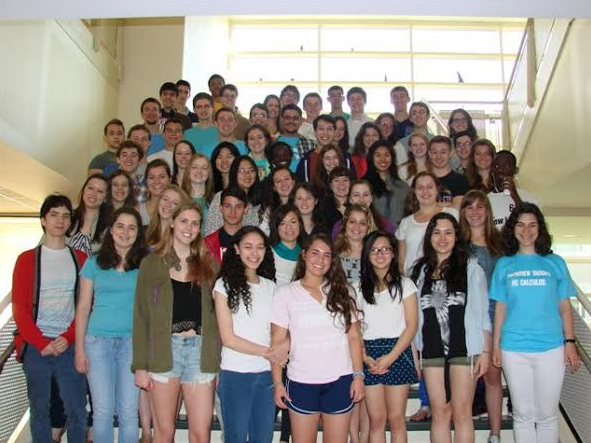To IB or Not to IB?

IB Class of 2013
To be or not to be, that is the question. Rather, to IB or not to IB? It seems that for years there has been a waging AP versus IB war that not even college admissions offices could provide the simple answer to. That is just the thing – both of these programs are supposed to prepare the student for college through rigorous course work and less than desirable exams, yet there are varying differences in the programs, which only leaves the student with more questions than answers.
Now, my experience with IB is different from many of my classmates in the IB Class Of 2014 at Harriton. I grew up in sunny Florida, where stress levels are about 100 times less than what students experience at Harriton. (Honestly, I did not even know what the SAT’s were until I moved to Harriton my junior year.) That being said, in Florida the AP vs. IB war was non-existent. In fact, IB students were required to take the AP exams at the end of their IB courses, along with the regular IB exams. After being chosen out of a pool of 400 students, 149 of my freshmen classmates and I ventured into the pre-IB program, an almost laid – back version of the IB program. The first English test I took, I received a 32%, as the goal of the pre-IB program was to gradually introduce students into the coursework of IB, obviously. My freshman and sophomore classes were based on the IB curriculum and I was already thinking about my extended essay topic. Luckily, I was only required to take one AP course before I moved to Philadelphia. In all honesty, I will admit that the pre-IB program did make the transition into the IB program very easy for me.
So, what can I tell you about the IB program in comparison to AP? I can tell you that IB students create a tight-knit community of hard-workers who are supportive on all aspects of the spectrum. Because the IB pool at Harriton is so small, you become very close, or fed up with your classmates, as the same people are in a large majority of your classes. With IB, you are required to take all IB courses unless you opt to take just an IB elective. Three of your courses will be Standard Level (SL) and three will be Higher Level (HL). HL courses are two-year courses and go into a greater depth of study, while SL courses offer a lower level of rigor. By the way, if you take Biology, Chemistry, or any of the IB electives as an SL course, the exams occur at the end of your junior year. At Harriton, English and History are required HL courses, and language is an SL course. Therefore, that leaves you with one option to choose an HL course, and the rest are SL. The only is exception is many students opt to take HL Math, which gives them more HL courses than most IB students at Harriton have.
Along with classes, IB students are required to write a 4,000-word extended essay (EE) on a topic of their choice, complete CAS hours, and take an additional class known as Theory of Knowledge (TOK). The EE is a guided process, and plenty of resources and help are available. CAS stands for creative, action, and service. These hours ensure that the student becomes a well-rounded citizen in all aspects of life. TOK is a philosophy style class that challenges the reason why you know things. Overall, the IB program is not just taking loads of classes; in a way it becomes a lifestyle. Also, you learn really cool abbreviations for everything (IB, SL, HL, EE, CAS, TOK).
On the other hand, from what I know about AP classes, you are not required to take your whole course load as AP, and can study what you like. I will say that the pace of AP is very fast compared to that of IB. My AP European History class I took my sophomore year required me to spend at least two hours a night on notes, and the pace of the class never slowed down. IB is a slower pace and seems to focus on the finer details.
In conclusion, there is no one correct answer to the great question, to IB or not to IB? It all depends on what you are looking for. If you feel like you are ready to be academically, emotionally, and mentally challenged, either program will ensure this. It all depends on what style of learning you prefer. Many college admissions offices state that they are searching for students who challenged themselves academically, and either program provides this experience.

